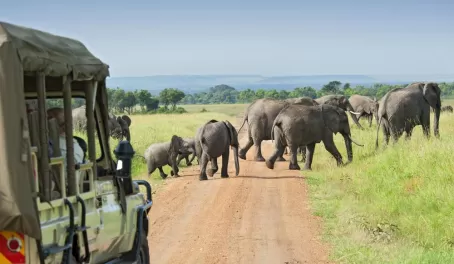At a Glance:
- Best time for an African safari: June-September
- Best weather (high season): July-August
- Worst weather (low season): December-April
There is perhaps no better way to see nature in its purest and most exciting form than exploring the plains of Africa on an authentic safari, and fortunately, there are a number of countries in southern
Africa that offer these experiences. In general, the winter season in Africa, from around June through September, is sunny and dry with cold nights, chilly mornings, and warm days. The summer - from October through May - is much hotter, with higher humidity and daily rain.
There are scores of national parks and other incredible sites to see on an African safari, and depending on which country, park, or camp you are planning to visit, the best time to visit might vary widely. As a good rule of thumb,
the most popular time to plan an African safari is during the dry winter months (June-September). The Dry Season is an ideal time to plan your African safari for a number of reasons:
- Scarce water drives the animals to congregate around the watering holes.
- Sparse vegetation makes the wildlife much easier to spot.
- Sunny, dry days offer pleasant weather for game drives.
- There are far fewer mosquitoes during this season.
Make sure to pack warm winter clothes for cold nights and chilly early morning game drives in the open-air vehicles.
Avoid October. The hottest month in southern Africa is October. As this part of the continent transitions from the dry to wet season, the temperatures often exceed 90℉ and have extremely high humidity.
The Wet Season (November/ December - April/ May) isn’t a terrible time to visit, but there are a few things you should know:
- There are usually daily showers that can range from a few hours to several days.
- Thicker vegetation and more available water make spotting animals more of a challenge.
- There are more mosquitoes during this time.
- Humidity is often high and can be rather uncomfortable.
- The rains can make some dirt roads impassable and camps and parks might temporarily shut down.
If you don’t mind these factors, then there are
advantages to traveling during this time:
- It’s usually much easier to find lower rates.
- The foliage is lush and beautiful.
- This is when newborn animals can be spotted.
- The wet season is the best time to see migratory birds.
Is the high season crowded?
If you’ve traveled to other parts of the world during the high season, you might feel wary of planning another trip where you might have to battle the crowds to see the different sites. Fortunately, this is not a major factor for African safaris. You’ll find that even during the busiest times of the year (which happens to be during the summer months of the northern hemisphere), the parks don’t feel very crowded. They are noticeably less crowded during the off-season, but many find that the tradeoff isn’t worth it. Furthermore, if you plan your trip with the right company you’re sure to have a good trip no matter what season you go in.
Adventure Life’s Trip Planners are here to talk travel!












